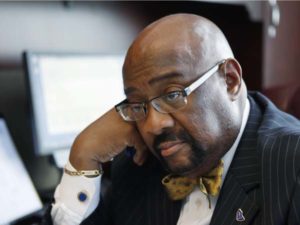Robert Jennings, the president of Lincoln University, announced his resignation on Monday only a few days after he sparked serious controversy for comments he made about false rape accusations at the school.
The university’s board of trustees ordered an internal review of the remarks made by Jennings, who was already facing criticism from the student body for scheduling commencement exercises during the week.
Before the investigation even concluded Jennings made the decision to simply step down from his position.
Until a permanent replacement can be found, Valerie Harrison will step in as acting president for the historically Black university, according to Kimberly Lloyd, chair of the university’s board of trustees.
Harrison’s background certainly made her a promising candidate as acting president, although there are no indications of whether or not she will be pushing to hold the position permanently.
Harrison has spent more than 15 years in higher education and has served as the vice president for legal affairs and general counsel at Arcadia University.
She has also obtained her Ph.D in African-American studies from Temple University after obtaining her masters degree in liberal arts at the same institution.
The sudden resignation marks the end of Jennings’ tenure, which did welcome a period of promising changes for the university.
During Jennings’ time as president the university launched its first fund-raising campaign for undergraduate scholarship funding.
The campaign is a major deal, especially for an HBCU.
Recent reports revealed that Black students are struggling to pay for higher education and are being forced to take out more student loans than their white counterparts.
This causes many Black graduates to be drowning in an unusually high amount of student loan debt by the time they obtain their degree and enter their respective fields.
His decision to reschedule commencement practices was also praised by many university officials although some students weren’t happy with the break in tradition.
By rescheduling the practices during the week, however, Jennings was able to save the university hundreds of thousands of dollars, which were able to be allocated elsewhere in the school’s budget.
“It’s a very small core of alumni,” said Robert Archie Jr. a member of the board of trustees who defended the decision. “Those people who don’t get the message that this is a business and it has to be run as a business.”
Jennings managed to overshadow all of those accomplishments this fall when he spoke to a crowd of female students and made questionable comments about recent false rape accusations on campus.
“We have, we had, on this campus last semester three cases of young women who after having done whatever they did with the young men, and then it didn’t turn out the way they wanted it to turn out – guess that they did?” Jennings said during the speech. “They went to [the university’s Department of] Public Safety and said, ‘He raped me.’ “
He then went on to express how frustrating it was to deal with the accusations and express his sympathy towards the young men who were accused.
The university did confirm that there were three cases of false rape accusations on campus but university officials still didn’t agree with Jennings’ message.
The comments supported the type of thinking that has caused many rape victims to keep their attacks a secret.
“First, he blames the victim,” Da Tom Hogan told the Huffington Post on Monday. “Second, he asks victims not to report. And third, he sings a sad song about the defendants.”
Robert Langley, head of the faculty union, was just as disappointed with the comments.
“Sometimes a woman will become intoxicated at a party and/or dress provocatively,” he said in an email. “However, that does not entitle a man to their body without their consent. It does not. No means no.”
It is unclear how long it may take to find a replacement but Lloyd said she believes the “future is bright” for the university.



